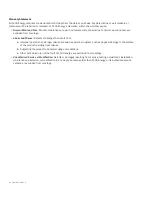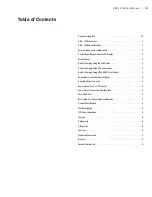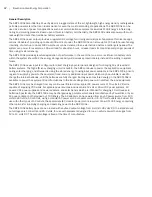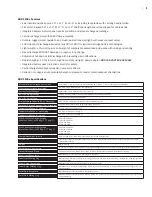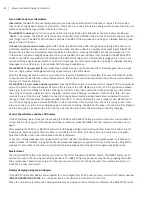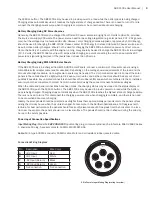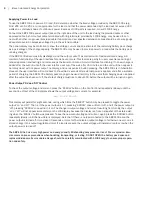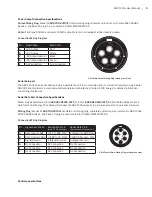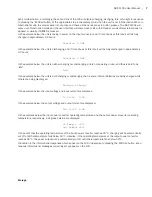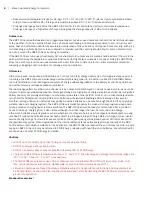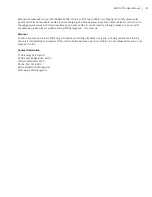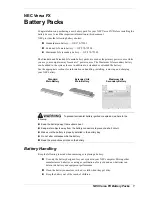
8
| Eleven Hundred Energy Corporation
• Recommended temperature range for storage: -20˚C (-4˚F) and 60˚C (140˚F) (store at low to moderate tempera-
tures to maximize battery life.). Storage at temperatures above 45˚C (113˚F) reduces battery life.
• Prolonged storage periods: Store the SBP-1100e at 20% to 50% capacity and at low to moderate temperatures.
Prolonged storage at a high state of charge will degrade the storage capacity of lithium-ion batteries.
Outdoor use
The SBP-1100e is weather-resistant and ruggedly packaged, but when used outdoors, it should not be left fully exposed
to the weather, if it can be avoided. Direct sun can cause overheating, and prolonged exposure to sun, rain, snow, salt
spray, dust and wind-blown debris may accelerate deterioration of the case and control panel. Some covering, such as a
rain-shedding, sun-blocking tarp or lean-to should be provided, and the covering should allow for some natural circula-
tion of air around the SBP-1100e case during hot weather.
If the SBP-1100e is to be used in extremely hot or extremely cold outdoor environments, shallow burial of the unit in the
earth will moderate the temperature extremes. Shallow burial might also be used as a means of hiding the SBP-1100e.
Since the earth may tend to become saturated with water from time to time due to rain, some waterproof protective
wrapping or bagging, and/or provision for drainage, may be desirable.
Lithium-Ion
Lithium-Ion packs, unlike Lead-Acid batteries, do not have to be fully charged before use. If charging is stopped prior to
full charge, the SBP-1100e can be discharged without diminishing cycle life. In addition, unlike NiCd and NiMH batter-
ies, Li-Ion batteries can be recharged at any state-of-charge without degradation to the battery’s cycle life performance
and without memory (voltage depression) problems.
The ideal usage pattern for lithium-ion batteries is to be charged and discharged on a daily to weekly cycle, as would be
typical of a solar panel-based application. Prolonged storage at a high state of charge should be avoided, as it degrades
battery capacity, but prolonged storage at a moderate or low state of charge (40% or less), or in a fully discharged state,
is not harmful. All batteries, including lithium-ion batteries, will slowly self-discharge while in storage. After several
months in storage, lithium-ion batteries may go dead, but the batteries can be readily brought back to life by applying a
suitable ‘wake-up’ charging regimen. The SBP-1100e automatically applies the ‘wake-up’ charge regimen when appro-
priate, and when charging power is made available. The SBP-1100e should be ready for normal use after a couple of
hours of ‘wake-up’ charging from a dead state, although it will take longer than two hours to reach full charge.
Lithium-ion batteries slowly degrade over time, whether or not they are being ‘used’ (charged and discharged) on a reg-
ular basis. Provided the batteries have not been subject to prolonged storage at a high state of charge, a typical useful
service life might range from two to five years. Typically, the capacity rating will degrade by about 20% after about 300
charge/discharge cycles. When degradation of the internal batteries reduces the energy storage capacity of the SBP-
1100e below a level which is suitable for the application, the SBP-1100e has reached the end of its service life. In some
cases, an SBP-1100e unit may be returned to 1100 Energy, reloaded with new lithium-ion batteries, and refurbished for
continued use. Contact 1100 Energy for details.
Cautions
•
DO NOT open the battery pack case! Doing so may risk personal injury.
•
DO NOT submerge battery pack in water.
•
DO NOT use battery pack cables not specified as compatible by 1100 Energy.
•
Charge the SBP-1100e at temperatures between 0° and 40° C. The discharge and storage temperature ranges are
-20° C to 50° C and -20° C to 60° C, respectively.
•
The SBP-1100e may present a risk of fire or chemical burn if mistreated. DO NOT short circuit, drop, crush, muti-
late, nail penetrate, reverse polarity, disassemble, or expose to temperatures above 100° C.
•
Lithium-Ion batteries are Class 9 hazardous materials subject to transportation restrictions including commercial
air transportation. Caution and planning should be exercised before transporting the SBP-1100e by common carrier
ground transportation.
Standard Accessories ¹
Содержание SBP-1100e
Страница 1: ...SBP 1100e Smart Battery Power System Software version 4 1 2 User Manual ...
Страница 14: ...10 Eleven Hundred Energy Corporation ...
Страница 15: ......
Страница 16: ...12 Eleven Hundred Energy Corporation ...


